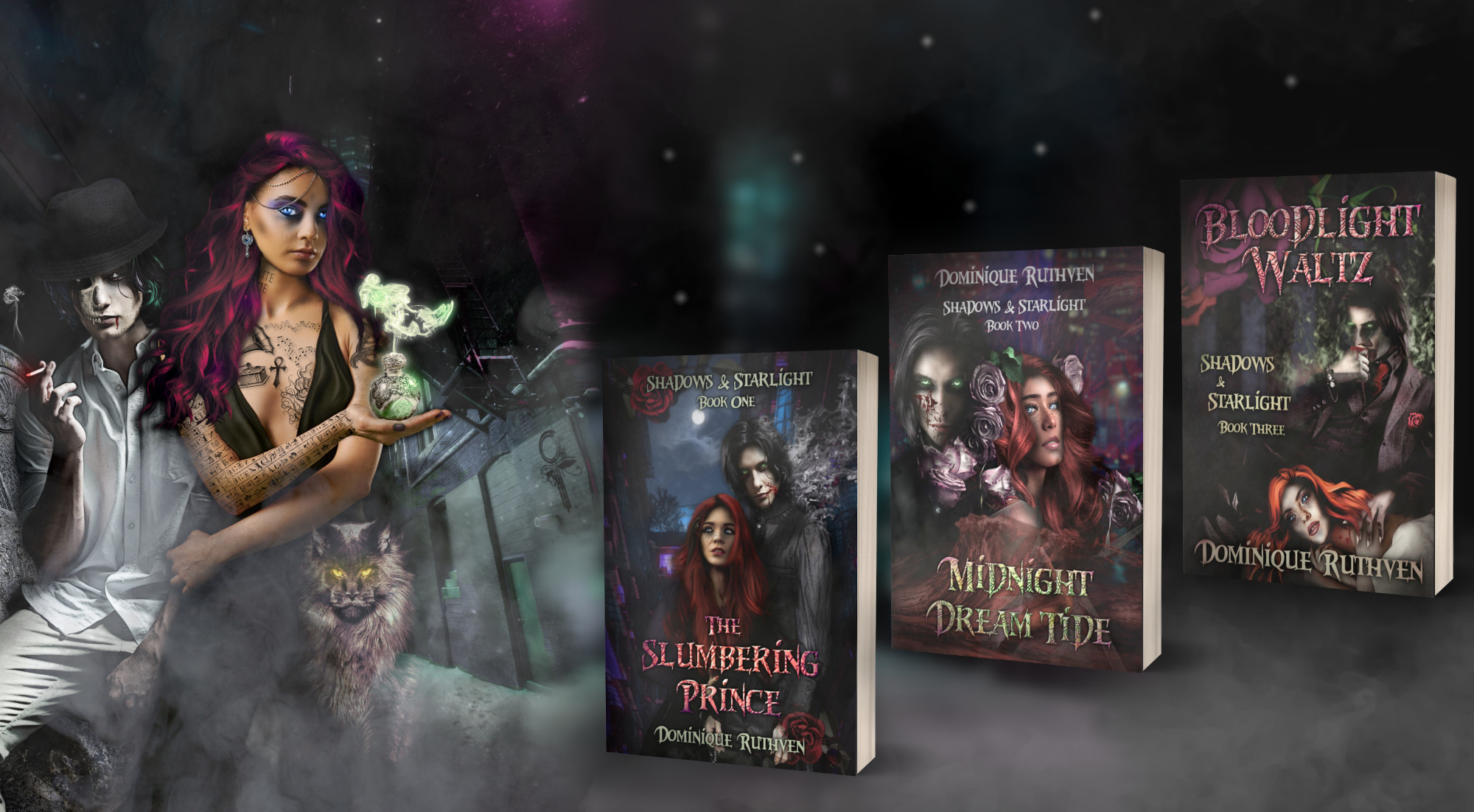
Baron De Breizh was inspecting the receiving room, her eyes casting over the walls as she stood with her back to me, her hands clasped behind her. They drew the eye, those hands, large, indelicate. I shook my head. I was beginning to lose focus in these long, lonely nights. I’d forgone Devika’s scarf, and missed it terribly, as I dipped my head to find her scent, and found, instead, only the smell of must that I couldn’t seem to shake from the house.
“It has a certain ruinous charm, I suppose,” the Baron said in her high, gratingly melodious notes. She’d stopped at a painting I had found, one of the only portraits remaining, after the socially acceptable and city-decreed looting of our holdings.
It was less a portrait and more of the artist’s attempt at capturing Father’s shadowed madness. His eyes gleamed crimson and violet out of the depths, and the onyx paint for his hair had been skilfully smudged and melded into the shadows that rose behind his dais. I didn’t have a mind for painting, but I knew the mind that had painted this one-
“Though, there are those that might perceive your hanging of this piece as an insult to our strict adherence to the rule of law, Praetor D’Asur.”
“It’s true,” I said, careful not to breathe too noticeably. The Baron’s child was watching me with those studious, solemn eyes that made me itch to turn the Glory onto her smug, little form. “The God King is a delicate subject in New Babylon, of late-”
“Of late?”
I drew in a slow, careful breath. “Yes,” I said, and instantly meandered to smooth out the edges of my faux pas. “A controversial subject, some might say. But isn’t all art controversial? Isn’t that where its beauty lies?”
“I’d advise you not to patronise me, Praetor,” the Baron said, turning a smile on me over her shoulder.
It made my skin crawl, as her hands did, and I had moments only to regret the risk I had taken in playing to the Baron’s not-so-secret weakness, for the lovelier things. It left me in a delicate position – apologise, traditionally the polite and decorous response, but that would reveal me to be weak and to have intended the slight, to begin with. Instead, I drew her eye to Victoria by walking behind the girl on my trajectory towards the painting.
I adjusted its sitting in a way that it hardly needed and was relieved to note that the Baron did not press the issue further.
The arrival of Baron De Breizh and her child had left me little by way of time to prepare. The calling card last night had said nothing of when I might expect their visit, and I had much to do, but I was in no position to turn them away. I’d hoped she’d delay an audience with us until the ceaseless repairs to the Glass Manor had been done, but-
The thudding of workmen’s tools gave me that all-too-human headache again, and I resisted pinching the bridge of my nose. It didn’t seem to bother my guests. In fact, the Baron seemed relatively taken with the Glass Manor’s derelict appearance, something I couldn’t possibly have foreseen. She studied the peeling walls and the cracks in the ceiling with the shining eyes of admiration.
I wondered, vaguely, if she knew just how obvious her weakness was, to those of us that cared to notice. I, cared to notice. I had to care to notice. She stood between me and my plans like the city’s most obstinate obstacle, and I would never bypass her Lordship over us if I could not gain her trust, as well as her good will. The destruction of Strigosia, while useful to me in some respects, had done nothing to alleviate the tensions between Vassal and Baron.
My mind wandered to the scarf, and from there, it was a short distance to feeling Devika’s scent envelop me, and the soft warmth of her skin, and the gentle radiance of her eyes as they looked upon me.
I had to close my own. It was near to impossible to keep the balance of everything I needed to, and I didn’t need to let the Baron see that. Nor her child, who seemed to follow her everywhere like a self-righteous shadow. Too old to still be a child, and somehow still attached to her genitor’s skirts like one. She’d been held back like some inept dunce, though the entire city knew she was anything but, and as such, she was obliged to stand in her genitor’s ever-busy shadow. To be monitored, until such a time as she could prove herself a gens. Rumour had it that that would be at the next Debutante, but rumour had suggested as much for almost fifty years. Fifty years of Debutante, of opportunities for liberation, and, somehow, here she was, still under the Baron’s thumb.
And I had to face this odd pairing alone.
At least I had Victoria.
She was behaving herself, for a change. I had had her scrubbed and cleaned, and her hair combed out, and it bounced up into soft ringlet curls that framed her face in a lovely sunrise halo. There was a blood tinge to her hair now, the colour of ripe apricots, that no amount of suds and fingers could get rid of. It was a bad sign. It didn’t bode well for her war against the shadow. The silent one that I had no way of calculating the odds on.
I’d seen a gens, some years back, who had lost an internal struggle with his shadow. He’d come out looking more the fish monster than the man, and I could still visualise it on the backs of my eyelids. If Victoria’s appearance was changing…
Saskia, of course, might have known the odds, but she was too busy these nights feeling sorry for herself to intervene, and I could only hope that the arrival of William Houldsworth would have the desired effect on Victoria. Even by my hopeful standards, if Victoria remained unresponsive for much longer, there was little to no chance of her coming out of her transition with even a passing resemblance of her humanity.
“The God King,” the Baron said. Evidentially, my attempts at distraction were ineffectual, and the Baron’s gaze was drawn back to the portrait on the wall. I should never have listened to Iuvent, who was once again, absent. He hadn’t wanted to be caught here with the Baron any more than I did, but he had every opportunity to leave. I, as Praetor to House D’Asur, was stuck facing the music, so to speak.
I should never have put that portrait up.
“An ugly reminder of the lawlessness to which we almost succumbed.”
“One can argue that the God King’s rule was lawless,” I said. “But one can just as easily argue that his rule was law, before there was anything else.”
The Baron turned her gaze on me again, her face impassive, dangerously so. For a moment, I held my breath, but then she smiled and a tinkling, high laugh echoed from her around the nearly-empty room. “Such a spirited defence,” she said. “No, no, do not waste your breath on apologies.”
I hadn’t thought that I was about to.
“I admit myself charmed, to be back in the halls of the once great Glass Manor.”
I held my breath.
“It was beautiful, in its prime.” Her fingers reached out to touch the splintering edges of the portrait’s frame. “It still is.”
“It is, isn’t it?” I agreed. The pumping of my heart seemed to localise the pain in my abdomen, and I had to resist clamping a hand over it. If I knew the Baron, and I liked to imagine I did, she was already aware of the injury, though propriety dictated she not mention it. I was grateful for propriety.
“That, however, is not,” the Baron said, flicking her fingers in the direction of Victoria. Her tone had changed, something dark and thick, like a wall of shadow, had come between myself and the trust I needed of her when she’d indicated Victoria. She didn’t deign to look at the girl, her eyes fixated on everywhere but as she continued to survey the room, like some auditor here to determine our value.
I supposed, that was what she was, and I didn’t dare reply to her assessment.
“This is the Venator’s, child, I presume?”
“She is,” I said, forcefully injecting gender, something like humanity, onto Victoria, in an effort to dissuade the Baron’s likely conclusion.
“A pity,” she said. “She would have been lovely.”
“She can still be.”
“Oh, come now,” the Baron said. “I am sure that I don’t need to waste my breath explaining to you why that is simply not true.”
“I’ll admit,” I said, carefully picking my words. “That she is having some trouble collecting herself, but I suspect that with the right-”
“Elle est enceinte,” said the Baron’s child, interrupting me. “Or she was.”
I had to bite down my anger. The name of D’Asur had been brought so low, that even a child, not yet gens, could interrupt me, as Praetor, and-
“Lucienne,” the Baron whispered. “Manners.”
Lucienne stepped back, turning her eyes away, her head to the side. She was, once again, the still, pale statue that followed her mistress like some ill-kept secret.
“Is she?” the Baron asked.
“Pregnant?” I looked at Victoria. It was true, Anna had informed me. She’d been showing when the servants had bathed and dressed her. It made the circumstances of her transition all the darker, all the more-
“I will take that as a yes,” the Baron said.
I couldn’t resist a sigh.
“Hideous.” The Baron’s voice had been brought almost to a whisper. “Hardly a wonder that she cannot return to herself, is it?”
Was it?
“A prisoner of her own circumstance,” the Baron said. “With the corpse preserved inside of her.”
Of course, there was no way that the child would have survived the shadow’s intricate work on Victoria while she’d slept in that grave. I hadn’t thought of it in that way, and it raised new disquieting questions.
“It’s a perversion,” the Baron said. “An ugly, perversion.”
I had to nod in agreement. Anger was rippling up and down my back, and my hands clenched into fists. I forced them to release, trying to remind myself to breathe, in silent, invisible breaths. “It might be reasonable to assume that this is why she cannot return to herself,” I said.
“It might be,” the Baron replied. “But that leaves only a handful of options. And I suggest,” she went on. “That if D’Asur wishes to keep this child as one of its own, and not face the consequences of harbouring a revenant, that you, perhaps, call in the services of a surgeon.”
I only knew of one surgeon amongst us that had the knowledge and the skill to handle such a task.
“And I am sure that it does not need saying, Praetor, but I shall say it anyway,” the Baron continued. “If the extrication of the foetus does not bring the girl back to herself, if she remains mindless, she will be put down, one way or the other.”
I could only nod again, catching Victoria’s eye as she stared into mine like she was digging to find my thoughts behind them.

